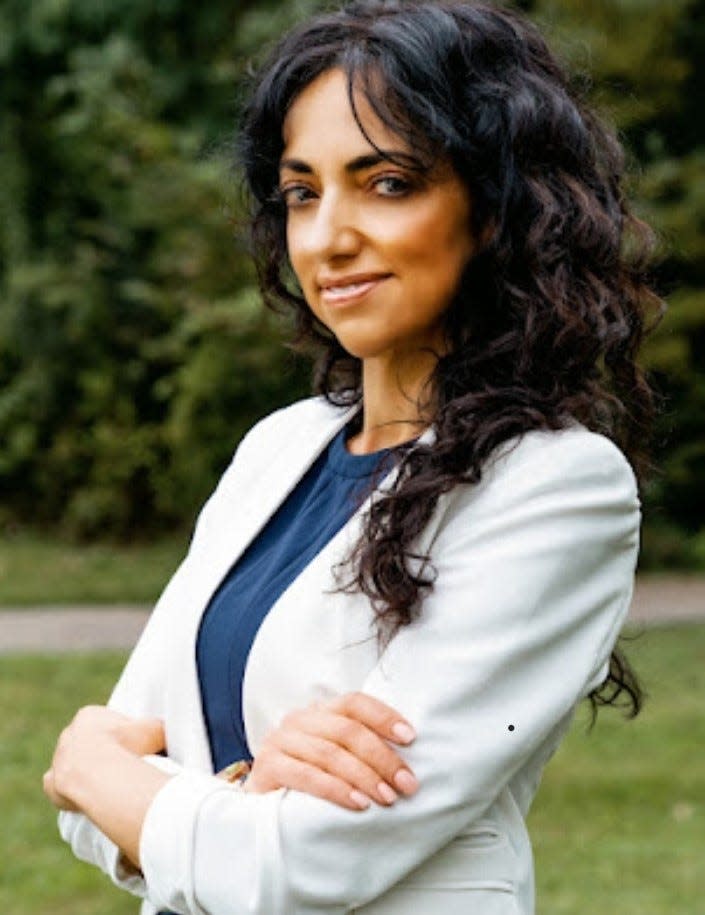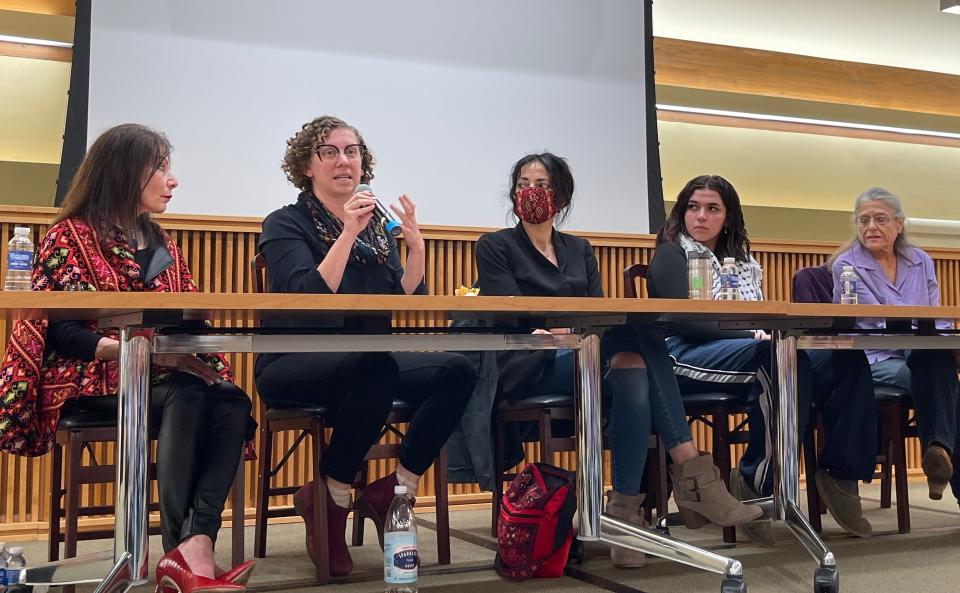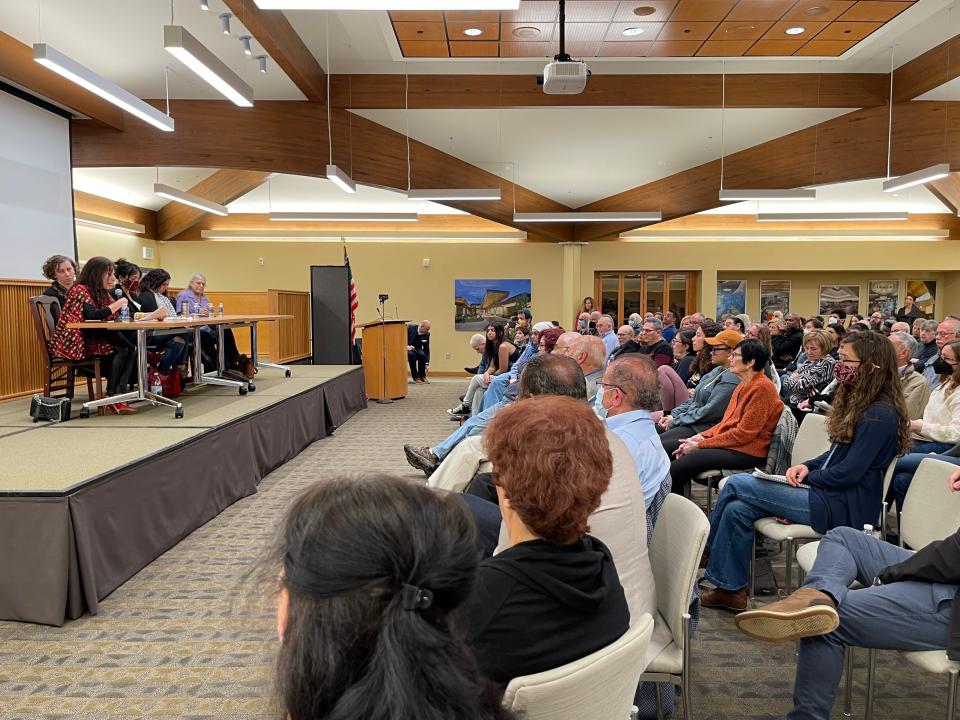Bloomfield school officials leave amid uproar in Jewish community over Palestinian speaker
After Huwaida Arraf finished her four presentations about Palestinian history to students at Bloomfield Hills High School, the attorney and Palestinian American activist, who was invited to speak as part of a diversity program, thought the talks had gone well.
But over the next few weeks, a storm of controversy erupted as some students, parents and Jewish leaders expressed outrage over her remarks on March 14, criticizing her history of Palestinian activism and accusing her of being anti-Israel and antisemitic.
After months of public forums, angry calls from parents for school officials to be fired and intense debate among Jewish, Arab and Muslim communities in metro Detroit, the Bloomfield Hills School District recently announced that its superintendent, Patrick Watson, will be retiring in July. And the principal of the high school where Arraf spoke, Lawrence Stroughter, has resigned "in order to pursue other opportunities in education," district spokesman Karen Huyghe said. The school district has also hired a Troy firm to investigate what happened.

The controversy over the past two months illustrates the challenges diverse communities face in trying to promote inclusion of all groups while also being able to have open dialogue. Both Jewish and Muslim communities feel their voices were not being respected.
'A chilling effect'
On April 30, a forum was held featuring Arraf and Jewish and Palestinian advocates hosted by Jewish Voice for Peace-Detroit at Bloomfield Township Public Library. They spoke out against the reaction of some school officials and Jewish leaders, saying that supporting Palestinians is not antisemitic. About 150 attended, with some protesting the event, said organizers. On May 3rd, Arraf took part in a rally condemning antisemitism outside a Royal Oak synagogue that had been vandalized with a Nazi symbol.
A discussion with Arraf and a local Jewish leader, Rabbi Asher Lopatin, had been set for Friday, May 12, on a podcast hosted by Peter Beinart, a journalist who often writes on the Palestinian-Israeli conflict. But earlier this week, Lopatin pulled out of the dialogue, Arraf said.
The departure of the school officials has concerned Arraf and her supporters.
"That creates a chilling effect," Arraf told the Free Press about the school officials leaving. "People who speak about Palestinian rights will think twice about it. And people who would give a platform for someone to speak about Palestinian rights also need to be concerned. And I think that's the intention of it, to silence the Palestinian narrative, and that's dangerous. That's why we did not want to be silent about it, while we wanted to do something to actually amplify how wrong this is."
Some Jewish leaders had differing views, praising the departures.
“There must be consequences for antisemitic agitation if we want to eliminate it, and the Bloomfield Hills community has imposed those consequences," Liora Rez, executive director of StopAntisemitism, said in a statement. "Allowing Ms. Araff to spread her vitriol at length on four occasions was unacceptably negligent ... and it is now the District’s responsibility to prevent similar incidents in the future."
The tensions over the past couple of months led to polarized debates, but also attempts to bring people together. Some Jewish and Muslim leaders are working on putting out a joint statement to promote unity and "protect both communities," said Dr. Yahya Basha, of West Bloomfield, a longtime Arab American and Muslim leader.
Arraf and Lopatin met and spoke with each other briefly at a recent dinner at a Warren mosque, the Islamic Organization of North American, that had invited them.
The debate comes as both sides are marking this spring the 75th anniversary of the founding of Israel, with Palestinians planning a rally Saturday in Dearborn calling it the Nakba, or "catastrophe," referring to the displacement of hundreds of thousands of Palestinians as the Jewish state was being established.
On Wednesday evening, U.S. Rep. Rashida Tlaib, D-Detroit, held a Nakba event with a packed crowd that U.S. House Speaker Kevin McCarthy, R-California, had earlier tried to block. The event was praised by Arab American and Muslim groups while the CEO of the largest Jewish civil rights group, the Anti-Defamation League, called it "disgraceful."
History of Palestinian activism
Arraf is a longtime advocate for Palestinians, co-founding the International Solidarity Movement and leading the Gaza flotilla protests in 2008 and 2010 that drew widespread attention. Born to Palestinian Catholic immigrants, Arraf, 47, of Macomb Township, is also a civil rights attorney and ran for Congress last year in the 10th Congressional District, losing in the Democratic primary. Her husband, Adam Shapiro, is Jewish and has been active alongside her in Palestinian activism over the years.
Arraf spoke to the Free Press in detail about what happened March 14. She said she had been invited earlier this year to speak at Bloomfield High School, along with other speakers representing various diverse groups such as trans, Asian American and Black communities.
After her first of four talks at the Bloomfield school on March 14, Arraf was told by Stroughter, the principal, to tone down her remarks, which included discussions about Gaza and the death of a volunteer Arraf had once worked with, Rachel Corrie, who died in Gaza 20 years ago on March 16, 2003, after she was run over by a bulldozer while protesting against Israel.
"I read a few lines of one of her emails" written a couple of weeks before Corrie died, Arraf said.
But most of her talk was about her own experiences, she said. Arraf started by speaking about how she grew up in a largely white area where she "tried to hide my my culture," but then embraced her heritage while studying at the University of Michigan. Arraf then spoke about her time as an activist.

"I ended the talk by kind of stressing ... there are forces out there that try to divide people based on our differences," she said. "But we can't let that win. ... Every person deserves the same rights and freedom."
After her talk, Stroughter approached Arraf, saying her speech was too political.
"The principal did speak to me ... made me aware that we had a lot of families in Bloomfield that had close ties to Israel," Arraf said, recalling the conversation. "And I said, 'you know, I work with Israelis ... That doesn't negate what is actually happening there nor my experience.' But I didn't argue too much. Because, he said, he doesn't want the students to shut me out. He wants me to reach them."
"And so I said, 'fine, I don't need to talk about Gaza. There's a lot of things to talk about,' " Arraf said. "And Rachel (Corrie) was taken out of the second, third and fourth talks."
Outrage among Jewish leaders
The evening after her talks, the Jewish Community Relations Council/American Jewish Committee (JCRC/AJC), a local Jewish advocacy group that often is the public voice of the Jewish community in metro Detroit, released a statement blasting Arraf and the district for allowing her to speak.
"We are horrified that known anti-Israel activist Huwaida Arraf was invited to speak at Bloomfield Hills High School as part of the school’s diversity initiative," the statement from JCRC/AJC read in part. "Arraf gave four presentations over the span of the day — increasing her anti-Israel rhetoric and making Jewish students - of which there were many in attendance — extremely uncomfortable. Some points Arraf made to students in attendance included: Israel is the oppressor, and Israel is an apartheid state."
The largest Jewish house of worship in Michigan, Temple Israel, released a statement the next day, saying leaders were "shocked and disappointed" with what they said was "anti-Israel and antisemitic rhetoric." A group of Jewish leaders, including Lopatin, other rabbis, and members of the Michigan Anti-Defamation League, met the following day with Stroughter and other school officials, reported the Detroit Jewish News.
Stroughter issued a letter of apology, but that was slammed by Jewish leaders as inadequate for failing to mention the specific topics of Israel or Jewish people. The next day, another letter of apology was sent from Pat Watson, the Superintendent of Bloomfield Hills Schools, to the community that was more specific, calling out Arraf by name, reported WDIV.
"We made a mistake," Watson said in his letter addressed to students, staff and parents. "We own what went wrong and will improve our practices. ... In preparation for this assembly, administration met with each of the five speakers to discuss the intent of the assembly and prompts. The prompt was to address an oppression or discrimination they have faced and what could the people around you have done to make this better. A guest speaker deviated from the prompts and discussed specific incidents, political in nature, which were outside of the parameters of the assembly and not their own lived experience."

Watson echoed the views of Temple Israel, saying that Arraf was using "antisemetic rhetoric" that "was shared with our students and we recognize its devastating impact. For this we are very sorry."
Arraf bristles at the claim she is antisemitic, noting her long history of working with Jews and Israelis on fighting for human rights. She said she was outraged by the recent antisemitic attack in Royal Oak, which is why she joined with others in the protest Thursday.
"My presentation to the students was not very political, didn't speak in detail about what's happening with Palestine," Arraf said. "Just my very presence and talk about Palestine — not that I said anything antisemitic — is what made them uncomfortable and caused the outrage. And I think that that needs to change."
Groups rally to defend Huwaida Arraf
At school board meetings, Arab American and Muslim leaders spoke out in support of Arraf. Some in the Jewish community also rallied to support Arraf, including members of Jewish Voice for Peace-Detroit, a liberal group that criticizes what it sees as human rights abuses in Israel.
Rabbi Alana Alpert of Congregation T’chiyah defended Arraf at the April 30 town hall at the library hosted by the group.
"We make it impossible for Palestinians to talk about their lives without being accused of antisemitism." Alpert said in a statement. "We don’t have any practice listening, we only have practice policing — 'you didn’t tell that story right, you didn’t say it in a way that we could hear it.' When we police and censor their most basic relationship to history and family, we tell Palestinians that they cannot exist in the world except according to our very strict parameters."
But Lopatin said Arraf should not have been invited in the first place to speak at the school

"The Bloomfield Hills situation was painfully flawed because all students were forced to hear Huwaida Arraf speak disparagingly and falsely about Israel — it was mandatory — in a setting that was supposed to be about inclusion and equity and respect for all opinions," Lopatin told the Free Press. "Arraf advocated against everything Bloomfield High School was about — building relationships even with people with whom you disagree."
Jewish leader calls it 'serious mistake'
Lopatin said one mistake made by the school was relying on students to select the speakers without adequate supervision.
"It was a serious mistake that initially hurt many Jewish students and then, ironically, caused pain to many Arab American and Muslim students," Lopatin said. "It was unfortunate because there are many Palestinian and Arab American — let alone Jewish — speakers who could have demonstrated the values of shared society, building relationships with those you disagree, and mutual respect."
Karen Huyghe, a spokesperson for the school district, sent the Free Press a statement the district had issued earlier, saying "our commitment to fostering an accepting and caring school environment is not without challenges."
"We actively listened to the concerns of our students, families, and community and put together a comprehensive plan toward healing as a community," the statement added. "The district will emerge stronger and better as a result of these conversations, undeterred from its commitment to all students and to foster a school environment of safety and support for all our students."
Contact Niraj Warikoo: [email protected] or Twitter @nwarikoo
This article originally appeared on Detroit Free Press: Jewish leaders object to Michigan school talks by Palestinian activist
